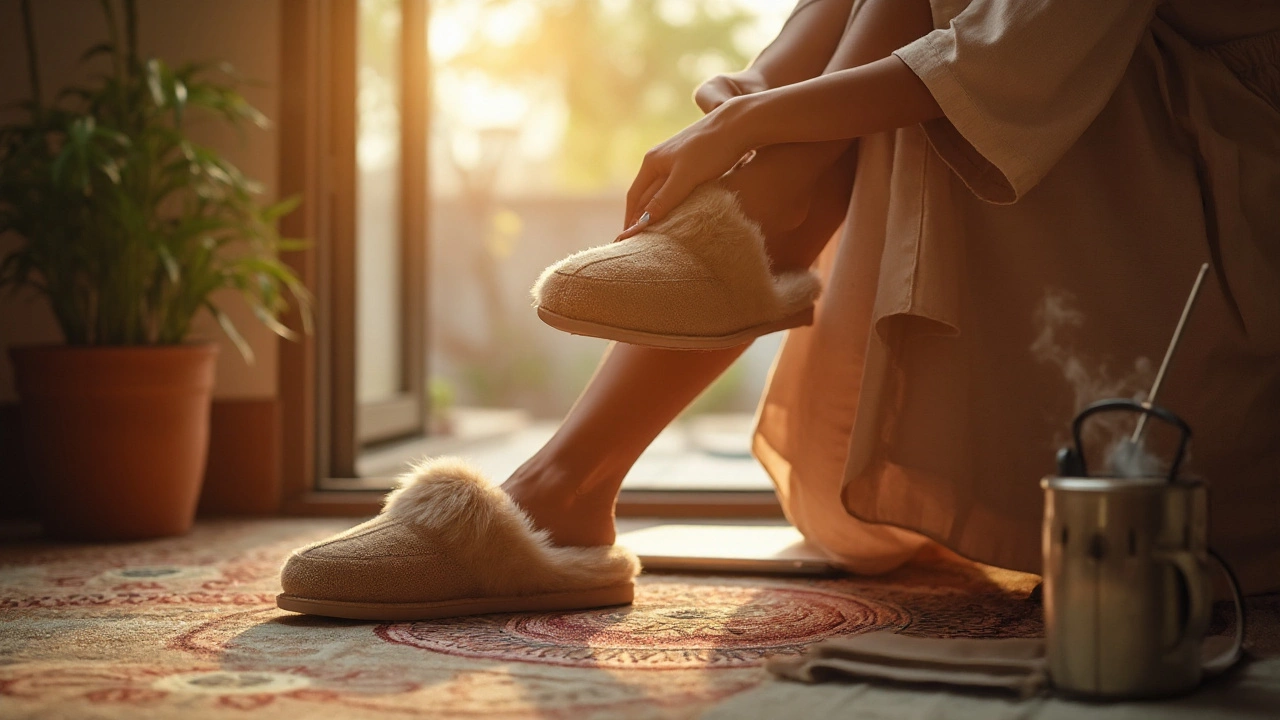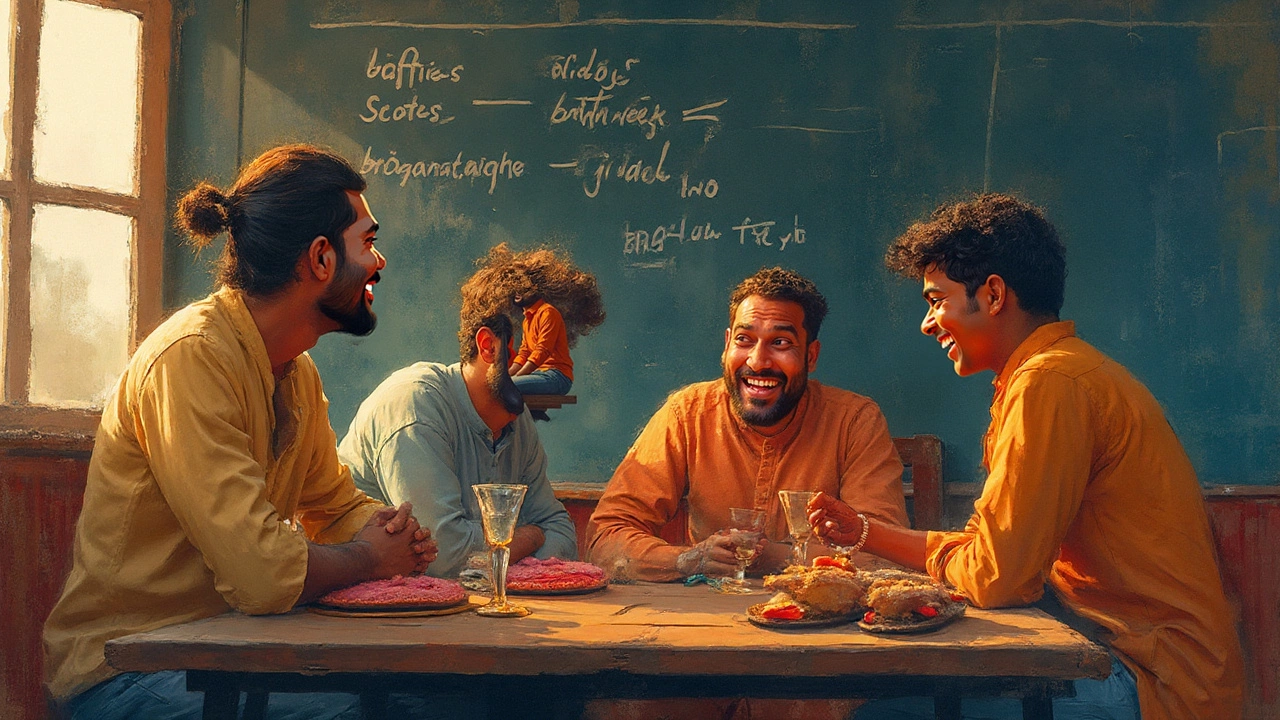What Is Scottish for Slippers? Baffies and Gaelic Brògan‑Taighe Explained

You clicked this because you want the exact Scottish word for “slippers,” not a vague guess. Here’s the straight answer: it depends on which Scottish language you mean-Scots or Scottish Gaelic-and the vibe you’re going for. Expect a quick, no-fuss definition, pronunciations that won’t tie your tongue, examples you can copy, and a cheat sheet you can trust.
TL;DR
- The Scottish word for slippers in Scots is “baffies” (pronounced BAH-feez). Singular: “baffie.”
- In Scottish Gaelic, say “bròg-taighe” (singular) or “brògan-taighe” (plural), literally “house shoe(s).”
- Scottish English also uses “slippers,” and that’s safe everywhere if you’re unsure.
- Use “baffies” in Scots/Lowland contexts; use Gaelic terms in Gaelic settings (schools, signage, community comms).
- Avoid mixing up “sannies” (that’s plimsolls/sandshoes) with indoor slippers.
Quick answer, pronunciation, and spellings
Scotland has two native living languages alongside English: Scots (a West Germanic language) and Scottish Gaelic (a Celtic language). Both are real, used, and distinct. That’s why “Scottish for slippers” isn’t one word.
Scots (Lowland Scots)
- Word: “baffies” (plural), “baffie” (singular)
- Pronunciation: /ˈbɑːfiːz/ (BAH-feez) for “baffies”; /ˈbɑːfi/ (BAH-fee) for “baffie”
- Spellings you may see: “baffies,” “baffie,” occasionally “bauffies” in older texts-same thing.
- Register: warm, homely, everyday Scots. Think slippers by the fire, not formal writing.
- Source note: “baffie/baffies” is recorded in the Dictionary of the Scots Language (SND/DOST) meaning “slipper(s).”
Scottish Gaelic (Gàidhlig)
- Words: singular “bròg-taighe” (BROHG TIE-uh), plural “brògan-taighe” (BROH-gun TIE-uh)
- Literal meaning: “house shoe(s)”-perfectly transparent and idiomatic in Gaelic.
- Spelling/grammar tip: “bròg” = shoe; “brògan” = shoes (plural). “Taighe” means “of the house.” Hyphenation is standard in compound nouns.
- Register: neutral. Great for signage in Gaelic-medium schools or bilingual materials.
- Source note: Listed in well-used Gaelic references such as Am Faclair Beag and Faclair na Gàidhlig.
Scottish English
- People across Scotland also just say “slippers.” If you’re writing for a general UK/Aus audience, this is the safest path.
What not to confuse
- “Sannies” = sandshoes/plimsolls (gym shoes), not indoor slippers. Common in Scots, especially for school PE gear.
- “Wellies” = Wellington boots. Not slippers. Ever.
Why the difference matters
If you’re chatting with a Glaswegian gran, “baffies” will get a smile. If you’re labeling footwear in a Gaelic classroom or writing bilingual signage, “brògan-taighe” is the right professional call. Audience and context decide the word, not a dictionary alone.

How to choose and use the right word (with examples)
I’m in Melbourne, but my inbox sees a lot of Scottish wording questions-from copywriters localizing ads to parents prepping a Highland-themed school day. Here’s a simple decision path you can follow.
- Who are you talking to?
- Everyday Scottish audience with Scots flavor? Use “baffies.”
- Gaelic speakers/learning settings? Use “bròg-taighe”/“brògan-taighe.”
- Mixed or international audience? Use “slippers” or pair it with the local term in brackets.
- How formal is it?
- Cozy, playful, vernacular copy? “baffies.”
- Official, educational, or signage? Gaelic term where appropriate, or plain “slippers.”
- Will pronunciation trip readers?
- Scots “baffies” is easy enough for English readers.
- Gaelic terms may need a phonetic hint the first time: “brògan-taighe (BROH-gun TIE-uh).”
- Do you need cultural color or clarity?
- Color: “baffies” adds instant Lowland homeliness.
- Clarity: “slippers (baffies)” covers both in one stroke.
Copy-and-use examples
- Scots (informal): “Mind an’ tak yer baffies aff at the door.”
Translation: “Remember to take your slippers off at the door.” - Scots (friendly reminder): “Whaur’s ma baffies? The floor’s baltic!”
Translation: “Where are my slippers? The floor is freezing!” - Gaelic classroom note: “Cuiribh air na brògan-taighe mus tèid sibh dhan talla.”
Translation: “Put on the slippers before you go to the hall.” - Gaelic sign (singular): “Bròg-taighe riatanach anns an rùm-cluiche.”
Translation: “A slipper is required in the playroom.” - Mixed-audience copy: “House slippers (baffies) by the fire-go on, get cosy.”
Pronunciation quick help
- baffies = BAH-feez
- baffie = BAH-fee
- bròg-taighe = BROHG TIE-uh (singular)
- brògan-taighe = BROH-gun TIE-uh (plural)
Register and tone tips
- “Baffies” reads warm and local. Perfect for lifestyle blogs, product pages for Scottish makers, or cosy winter campaigns.
- “Brògan-taighe” reads precise and respectful in Gaelic settings. Use it where Gaelic is expected or celebrated.
- “Slippers” keeps things simple when your audience spans Scotland, England, Australia, the lot.
Regional notes (broad brush)
- Lowlands (Glasgow, Ayrshire, Lothians, Fife): “baffies” is widely understood.
- North-East (Doric/NE Scots): “baffies” also common; spelling/pronunciation can vary slightly, but meaning sticks.
- Highlands & Islands: You’ll hear English “slippers,” Scots in some communities, and Gaelic terms in Gaelic-medium contexts.
Why “sannies” won’t work here
“Sannies” are plimsolls-thin-soled gym shoes for school PE-recorded in Scots (and still used). They’re for sports halls, not your living room. If you’re writing a product page and mix these up, you’ll send shoppers hunting in the wrong aisle.
A quick word on origin
You’ll see “baffie” tied to the Scots word “baff,” a soft smack/slap sound, which fits the shuffling, slap-soft step of a slipper. Etymology notes like this show up in entries of the Dictionary of the Scots Language. Handy to know, not essential to use.

Cheat sheet, mini‑FAQ, and next steps
Bookmark this section if you’ll be writing or translating regularly. It’s the bit you’ll reuse.
Cheat sheet
- Everyday Scots: “baffies” (plural), “baffie” (singular)
- Gaelic: “bròg-taighe” (singular), “brògan-taighe” (plural)
- Neutral/English in Scotland: “slippers”
- Not slippers: “sannies” (plimsolls), “wellies” (rubber boots)
- Pronunciation: BAH-feez / BAH-fee / BROHG TIE-uh / BROH-gun TIE-uh
- Spelling variants: “baffies,” sometimes “bauffies”; stick with “baffies.”
Quick decision guide
- If your readers love Scots flavor → write “baffies.”
- If it’s for Gaelic-medium education or bilingual signage → “brògan-taighe.”
- If your audience is mixed or international → “slippers (baffies)” the first time, then “slippers.”
- If you’re selling to a Scotland-based audience and want cozy authenticity → product title “Baffies,” product description includes “slippers.”
Mini‑FAQ
- Is “baffies” slang?
It’s informal Scots, not throwaway slang. It’s established enough to appear in the Dictionary of the Scots Language. - Is there a single “official” Scottish word?
No. Scots and Gaelic are both Scottish. Pick based on language context and audience. - Do Scots speakers also say “slippers”?
Yes. Scottish English is common in daily life. “Baffies” adds local flavor; “slippers” is universal. - How do I pluralize the Gaelic term?
Singular “bròg-taighe,” plural “brògan-taighe.” You don’t add an extra “s.” Gaelic handles plural inside the noun itself. - Do I capitalize Gaelic terms?
Not unless they start a sentence or are part of a title. Hyphen stays: “brògan-taighe.” - Where is “baffies” understood?
Widely across the Lowlands and North-East. Even if someone doesn’t use it daily, most will clock the meaning from context. - Any other Scots words for slippers?
Historically, variants pop up, but “baffies” is the modern, widely recognized choice. - Can I use “baffies” in professional copy?
Yes, if your brand voice leans warm/local and your audience is Scotland-based. Pair it with “slippers” at first mention for clarity.
Pitfalls to avoid
- Don’t call plimsolls “slippers.” If it’s for PE, you want “sannies” (Scots) or “plimsolls” (English).
- Don’t mix Scots and Gaelic in the same label unless the whole piece is bilingual and clearly marked.
- Don’t over-hyphenate Scots. “baffies” is just “baffies.”
- Don’t assume one form covers all Scotland; pick the register that suits your setting.
Style move you can borrow
When you need both local color and clarity, introduce both like this: “Comfy house slippers (baffies) you’ll live in all winter.” Keep the Scots word in parentheses the first time, then use whichever term fits your tone for the rest.
Credible sources (for your peace of mind)
- Dictionary of the Scots Language (SND/DOST): entries for “baffie/baffies.”
- Am Faclair Beag: common dictionary reference for Scottish Gaelic; includes “bròg-taighe/brògan-taighe.”
- Faclair na Gàidhlig: major Gaelic dictionary project; useful for confirming forms and compounds.
Next steps
- For writers/marketers: Decide your voice. If it’s homely Scots, lead with “baffies” and anchor it with “slippers” once. If it’s formal or educational, go with the expected language (Gaelic in Gaelic contexts; English elsewhere).
- For teachers/parents: Print a small label set: “slippers,” “baffies,” “brògan-taighe” with pronunciations. It turns vocabulary into a quick language moment.
- For product pages: Use keyword pairing: Title “Baffies,” meta and body include “slippers” to match search behavior. Add a short note: “Known as ‘baffies’ in Scots.”
- For travelers: If someone says “Take your baffies off,” they mean your slippers-no drama, just shoes off at the door.
Troubleshooting
- I’m not sure if my readers know Scots. Start with “slippers” and add “(baffies)” once. If engagement is high on the Scots term, use it more next time.
- I need Gaelic but worry about typos. Copy exactly: “bròg-taighe” (sing.), “brògan-taighe” (pl.). Keep the hyphen. If you can’t do accents, explain once in plain text and keep consistency.
- My tone is luxury, not rustic. Use “slippers” in headings. Bring “baffies” into storytelling lines, not the core product taxonomy.
- I’m writing for kids. Add the sound-out cue: baffies (BAH-feez), brògan-taighe (BROH-gun TIE-uh). Kids pick it up fast.
Short version to remember: Scots says “baffies,” Gaelic says “brògan-taighe,” and “slippers” works everywhere. Pick the one that fits your audience and tone, and you’ll sound spot-on.
- Sep, 7 2025
- Violet Greenfield
- 0
- Permalink
Written by Violet Greenfield
View all posts by: Violet Greenfield